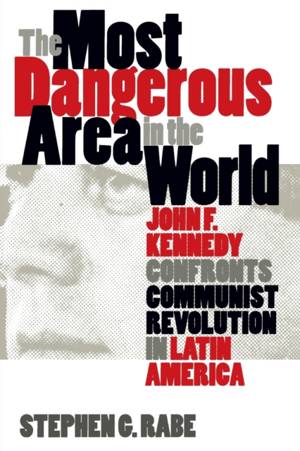
- Afhalen na 1 uur in een winkel met voorraad
- Gratis thuislevering in België vanaf € 30
- Ruim aanbod met 7 miljoen producten
- Afhalen na 1 uur in een winkel met voorraad
- Gratis thuislevering in België vanaf € 30
- Ruim aanbod met 7 miljoen producten
Zoeken
Most Dangerous Area in the World
John F. Kennedy Confronts Communist Revolution in Latin America
Stephen G Rabe
€ 57,95
+ 115 punten
Omschrijving
In March 1961, President John F. Kennedy announced the formation of the Alliance for Progress, a program dedicated to creating prosperous, socially just, democratic societies throughout Latin America. Over the next few years, the United States spent nearly $20 billion in pursuit of the Alliance's goals, but Latin American economies barely grew, Latin American societies remained inequitable, and sixteen extraconstitutional changes of government rocked the region. In this close, critical analysis, Stephen Rabe explains why Kennedy's grand plan for Latin America proved such a signal policy failure.
Drawing on recently declassified materials, Rabe investigates the nature of Kennedy's intense anti-Communist crusade and explores the convictions that drove him to fight the Cold War throughout the Caribbean and Latin America--a region he repeatedly referred to as "the most dangerous area in the world." As Rabe acknowledges, Kennedy remains popular in the United States and Latin America, in part for the noble purposes behind the Alliance for Progress. But an unwavering determination to wage Cold War led Kennedy to compromise, even mutilate, those grand goals.
Drawing on recently declassified materials, Rabe investigates the nature of Kennedy's intense anti-Communist crusade and explores the convictions that drove him to fight the Cold War throughout the Caribbean and Latin America--a region he repeatedly referred to as "the most dangerous area in the world." As Rabe acknowledges, Kennedy remains popular in the United States and Latin America, in part for the noble purposes behind the Alliance for Progress. But an unwavering determination to wage Cold War led Kennedy to compromise, even mutilate, those grand goals.
Specificaties
Betrokkenen
- Auteur(s):
- Uitgeverij:
Inhoud
- Aantal bladzijden:
- 272
- Taal:
- Engels
- Reeks:
Eigenschappen
- Productcode (EAN):
- 9780807847640
- Verschijningsdatum:
- 22/02/1999
- Uitvoering:
- Paperback
- Formaat:
- Trade paperback (VS)
- Afmetingen:
- 147 mm x 235 mm
- Gewicht:
- 408 g

Alleen bij Standaard Boekhandel
+ 115 punten op je klantenkaart van Standaard Boekhandel
Beoordelingen
We publiceren alleen reviews die voldoen aan de voorwaarden voor reviews. Bekijk onze voorwaarden voor reviews.











